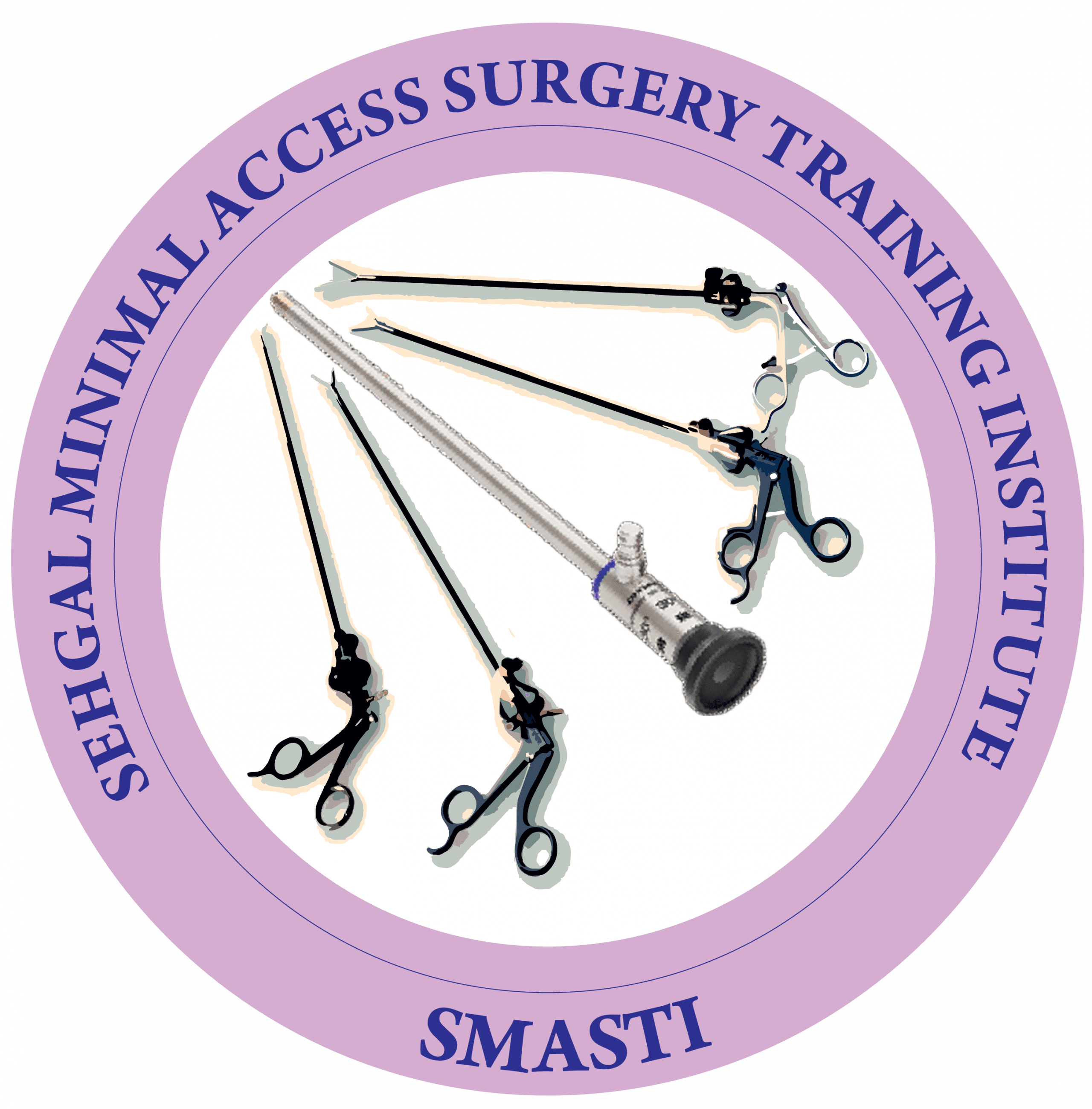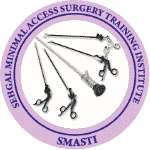FAQs
We value your inquiries and feedback. Whether you have questions about our courses, services, or anything else, our team is here to assist you. Please don't hesitate to reach out to us using the provided contact details or by filling out the inquiry form below. We look forward to connecting with you!
GENERAL INFORMATION
(SMASTI) is the academic wing of SNH. The training is imparted under the aegis of International Association of Minimal Access Surgeons (IAMAS). SMASTI offers minimal access surgery training in various specialities like laparoscopic and general surgery, gynaecology and hysteroscopy, upper and lower GI endoscopy. It also offers Residency Programs to already practicing minimal access surgeons, who want to enhance their skills and competence. Laparoscopic surgery is industry and technology driven. With the rapid pace of upgradation of technology, the surgeon also has to keep updated about the recently launched instruments and devices in the market. At SNH, the candidates are taught in detail about the latest hand instruments, both disposable and reusable, access instruments, and optical instruments including different types of camera systems. The USP of training at SNH is that it is a hands-on training program, which includes observing and assisting in the first few cases followed by performing surgeries under the close guidance of the consultant, keeping in mind patient safety.
SMASTI provides one of the best infrastructure in the world for laparoscopic training distributed in 30,000 square feet Area. Classes and Lab of “Hands On” training are ultramodern and high tech to ensure that every surgeon and gynecologist have the chance to identify their individual needs and prescribe individualized training methods. Though at least half of our Hands-On class time is dedicated to the lab and Operation Theatre, we keep the lab open 12 hours a day so you can access it after hours whenever you like for independent study. The place is yours; do with it whatever you like with proper care of instrument. And when our time together in class draws to close, you’re going to have us at your fingertips for continuing answers and advice, forever, for free. Can you find that anywhere else?
All hands-on classes dedicate approximately half of your total class time each day to supervised hands-on instruction in small groups. But that isn’t all: at each location our secure Laparoscopic Lab is open 8 hours a day for your independent practice. Our faculty at SMASTI are present for the entire course, preceptive at the real OT live surgery, present in lab, at every break and during lunchtimes, always available to attendees to teach suturing, knotting, all small tricks, standards of care and laparoscopic excellence. Other courses have faculty drop in for their talks and disappear.
We give plethora of study material! Your tuition fee includes all course materials, Lab Hands On sessions, continental breakfast, lunch, and unlimited post training Online supports are completely free. We give Online resources and laparoscopic HD video.
There will be no any extra charge to utilize hospital resources like Internet, laparoscopic instruments, O. T. Dress, library, Videos, CD. Working lunch, snacks tea, coffee and soft drink will be provided whole day during course, free of cost..
Of course, and you can do it all at SMASTI. It doesn’t matter if you’ve spent time in class with us or not; we’re professionals supporting our fellow professionals.
We never allow any instrument company to influence our training program because it is university guidelines so that our training will not be influenced by manufacturer policies.
– Students applying attending two courses simultaneously (in the same calender month) will be eligible for a 20% discount in the shorter duration course.
– Institute managed by pioneers of MAS with an aim to take professionals to the next level of expertise
– Affordable fees with no hidden expense.
– Dedicated and experienced faculty with experience of conducting over 70,000 surgeries.
– Structured syllabus with course curriculum in line with reputed international and national institutes.
Technical skills in the field of laparoscopic surgery have been taught in specialized training centers for last ten years. Studies have shown that unlike open surgery, mere observing cases or assisting a surgeon does not improve the necessary skill to become a laparoscopic surgeon. Ergonomics and physics of laparoscopic surgery is completely different than open surgery and mastery of hand-eye coordination requires thorough exposure over state of the art HD wet operating room tissue followed by same skill demonstration in operation theatre. Laparoscopic techniques skill acquisition need “Hands On” training under specialized guidance of expert laparoscopic surgeon because the field of view is limited, peripheral vision is not possible and the operative field is represented in two dimensions on a video monitor. Unlike open surgery, where the surgeon is facilitated verbally and manually through assistantship from the opposite side of the operating table, in video-endoscopic surgery, verbal directives is not of much help and there is an increased reliance on the technical skills of the surgeon. To achieve these basic skills and to imbibe the principles of laparoscopic surgery, training in simulated operative environments and observation of state of the art surgery in operation theatre has become a necessity.
It is logical to expect that those who have obtained higher specialized
degree from reputed institute can only pass on the knowledge and
experience to the peers in structured way. Most of the faculty of other
institute is surgeons without having any degree in Laparoscopic surgery.
Whereas our Chief faculty and the Director Dr.Narin Sehgal. MBBS, MS (GEN.
SURG), FIAGES, D.G.E. (GERMANY) Minimal Access, Bariatric & General
Surgery.
Dr. Sehgal was among the early few to adopt Laparoscopy in India and to
propagate and contribute to its growth – he has been conducting
Laparoscopic Surgery since 1993 including basic and advanced Lap
surgeries, Gynae surgeries and Urology surgeries. He is also highly
experienced in Stapler Haemmorrhoidopexy, Transanal Haemorrhoidal
Dearterialization and STARR. Under Cystoscopy & Ureteroscopy his expertise
lies in TURB, TURBT, Bladder Stone, Ureteroscopic and Removal of Stones.
F.MAS and D.MAS are separate course and after finishing Fellowship in Minimal Access Surgery (F.MAS) anytime in future you can finish your Diploma in Minimal Access Surgery (D.MAS). Please keep in mind that you should must have F.MAS degree from our institute if you want to get admission in D. MAS. We do not apply direct admission to D.MAS if candidate does not have the fundamentals of laparoscopic surgery cleared.
– The Laparoscopic courses at SMASTI meet the guidelines
established in the SAGES Framework for Post-Residency Surgical Education
and Training. The University Master in Minimal Access Surgery (M.MAS),
Diploma in Minimal Access Surgery (D.MAS) and Fellowship in Minimal Access
Surgery (F.MAS) course designed and offered by Laparoscopy Hospital is
recognized International Accreditation Organization (IAO), Houston, USA.
– The “Hands On” training which is accepted globally by the Government of
more than hundred countries is scientifically designed by academic council
of World Association of Laparoscopic Surgeons and it ensures that the
participants are able to do all the taught surgery themselves after
training.
– Many thousands of surgeons and gynecologists from every corner
of the globe have been trained for advanced laparoscopic skill at
Laparoscopy Hospital within last 23 Years. The entire certificate will be
awarded by Government Recognized University.
– Laparoscopy Hospital is an
accredited institution recognized by renowned accreditations agencies for
Laparoscopy, namely the International Accreditation Agency of World
Association of Laparoscopic Surgeons.
– Accreditation is a process through
which an institution maintains and improves its standards and practices.
Accrediting organizations develop a criteria or standards by which a
Laparoscopic Training standard can be measured.
Accreditation is important to various constituent groups because it represents an institution’s commitment to quality education. Being accredited warrants that an institution meets the quality criteria set by the accreditation agencies. Business and industry leaders are interested in quality institute and consider accreditation status an important factor when hiring. Citizens are assured of accountability and of value for their tuition knowing their training meets established standards and undergoes regular re-evaluation by teams of professionals whose focus is on improvement of surgical skill. Accreditation serves the following purposes: Assuring Quality: Accreditation is the primary means by which colleges, universities, assure education quality to students and the public. Source of Improvement: Accreditation provides a stimulus for continuous improvement in educational practices due to the periodic re-evaluation by accrediting agencies. Easing Transfer: Accreditation of institutions and programs is important to surgeons for the smooth transfer of credits among colleges and universities. Recognition: Accreditation of institutions and their programs accords them recognition as providers of high-quality education. Federal, state, and local agencies openly refer surgeons to these institutes and encourage students to consider only accredited institutes. Engendering Employer Confidence: The accredited status of an institution or program is important to employers when evaluating credentials of job applicants and when providing financial support to current employees seeking additional education.
You can Visit Our Faculty webpage to know More about faculties of SMASTI.

